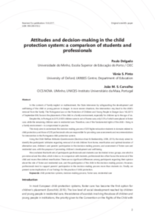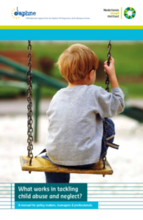Displaying 41 - 48 of 48
This study investigated Portuguese adolescent adoptees' perceptions of their attachment relationships with their adopted parents compared to adolescents living with biological parents and adolescents living in residential care.
The goal of this study is to analyze, from the adoptee's point of view, the experience of being adopted in the school context and the impact of the child's social competence, social disclosure of adoption and social reaction to the adoptive status.
This study aims to understand the decision-making process of 200 higher education students in domains related to child protection, and those of 200 professionals who are responsible for providing case assessments and recommendations for intervention in the Portuguese child protection system.
The objective of this study was to develop and test an instrument to measure self-representation of youths in residential care in Portugal.
Meant to highlight the maxim that every child deserves the best that we all have to give; this book provides a review of the progress made since The UN Convention on the Rights of the Child. It contains reports from 21 countries on the status of the rights of the child. The countries are: Australia, Canada, Croatia, Denmark, France, Germany, Greece, India, Iran, Japan, Portugal, Romania, Scotland, Serbia, Solomon Islands, Spain, the Netherlands, the UK, the USA, Uzbekistan and Venezuela. There are no reports from Africa.
Using structural equation modeling the present study analyzed the associations between quality of sibling relationship and self-concept of institutionalized adolescents, testing the mediating role of resilience in this association, and the moderating effect of the maintenance of contact between siblings.
The current study seeks to examine the social images associated with children and youth in residential care and the respective care institutions in Portugal.
This manual is the main outcome of the European Commission Daphne III programme, Prevent and Combat Child Abuse: What works? Involving regional exchanges and research from five countries (Germany, Hungary, Portugal, Sweden and the Netherlands), this manual brings together knowledge on what works in tackling child abuse. The manual suggests evidence and practice-based prevention and response strategies against child abuse and neglect, including programs and services that have been shown to be successful in strengthening family care.


